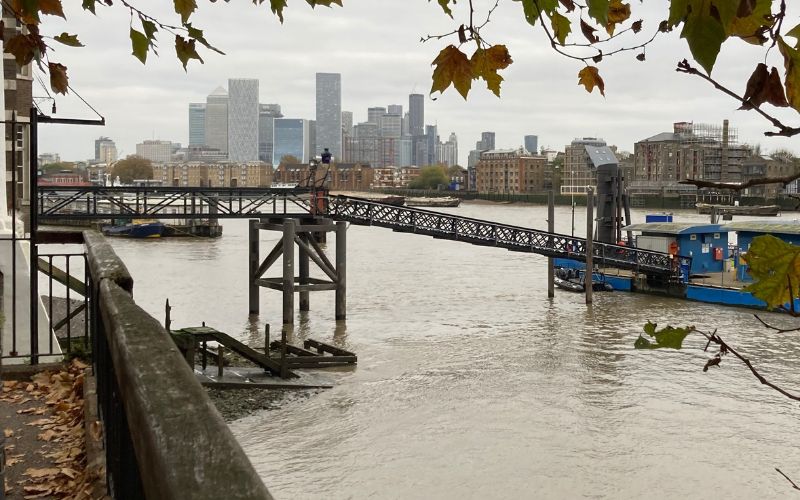London ranks as the city most vulnerable to extreme weather in England, according to a new report from insurance company AXA UK.
The report breaks down where homes are most likely to be effected by extreme weather, ranking areas by Westminster parliamentary based on flood risk, heat risk, and socioeconomic vulnerability.
These metrics are then combined to give a overall ‘Climate Risk’ ranking, as well as categorisation of constituencies as ‘Rising Tides’, ‘Hot Spot’, ‘Extreme Weather’ (indicating vulnerable to both flooding and heat), or ‘Least Concern Area’.
Of London’s 75 constituencies, 67 are categorised as vulnerable to ‘Extreme Weather’, with the other eight being a ‘Hot Spot’, meaning there isn’t a single area of the capital that won’t feel the effects of climate related extreme weather in a serious way.
The average ranking spot for a London constituency is 62, in comparison to all other constituencies in England expect London, where the average is 306.
The top 20 constituencies in the UK on the heath risk index are inner London constituencies, indicating just how at risk London is to extreme heat.
Whereas a lower, but still concerning, 12 of the top 20 constituencies on the flooding index are in London, with constituencies around Hull and Lincolnshire taking some of the highest spots.
Together with the socioeconmic data, this leads 14 of the top 20 constituencies in the overall climate risk rankings are from the capital.
Axa previously called on the UK Government, before the election, to create a Minister for Resilience, but such a position has yet to be created, despite promises by Labour.
Douglas Barnett is the Director of Mid-Market and Customer Risk Management with AXA, with part of his job overseeing climate and resilience, seeking to make customers more resilient to the threats of extreme weather.
He said: “Labour did put that in their manifesto but we’re still to see it come through. It’s about taking resilience seriously, not just during a floor event or a storm event. It takes long term joined up thinking.”
A minister for resilience would have the potential to set a concrete direction, rather than a patchwork of various efforts by government departments, local councils, and devolved authorities.
Barnett explained that AXA created the report using claims data from commercial and retail businesses, helping look at cost of damage caused by extreme events, as well as locations most ikely impacted.
The report projects that damage from flooding could be costing £818 million by 2055 in England, but noted defences have previously saved billions in damaged based on past events such as 2019/20 winter floods.
London, with its high population and density of vulnerable residents, is particularly at risk to heat, both in terms of public health and infrastructure.
Barnett said: “Heat hits the most vulnerable first. If you had a resilience minister, that’s where you’d think they might start.”
“If you’ve got extreme heat, most people go to air con, but the issue is that UK power networks can’t handle it.”
During the 2022 heatwave, the power grid in the West End had such demand due to air conditioning being used that energy intensive venues like theatres couldn’t open, as the grid didn’t have capacity.
An alternative is more green spaces, but Barnett is worried that in London, where housing is being built en masse, there aren’t enough green and blue spaces being built.
He added: “A great thing to dispel heat is green spaces and water, but what you’ll find in London is a very dense population and lots of concrete and tarmac that retain heat.”
The report makes mention of the Government’s ambitions to build 1.5 million houses over the next five years, and claims that building resilience into new housing, as well as no longer building on flood planes, should be a priority.
The report was discussed with Flooding Minister Emma Harding MP at a round table, attended by AXA CEO Tara Foley and others last week.
Barnett added: “We broke the data down by parliamentary constituency because it makes it easier for us when talking to MPs to identify the impacts on their areas.
“And it makes it easier for people to identify by where they live.”
Climate activist Sunita Ramani got involved with the climate strike movement while at university, as well as groups like Green New Deal Rising in London.
She now works at climate communications agency Green House, working to support charities, non-profits and business to support their efforts in tackling the climate crisis across a variety of sectors.
She welcomes the report by AXA, and any research into the effects of climate change, but wants to see more solutions moving forward.
She said: “We then need all sorts of stakeholders to be stepping in and saying here’s what we’re going to do about it, and that’s the Government, local councils, businesses.
“Without that, research like this risks scaring people, turning them off from the situation, or just being another piece of research we move on from and don’t do anything about.
“We need to stop just reporting the threats and the risk and spend energy and finance and ambition around developing and creating solutions.
“The impacts are already being felt and building resilience is one of the biggest things that we should be prioritising.”
“Going into communities, particularly in such a rich and complex place as London, is vital.
“We need to bring people together and imagine the future that they want to see and work backwards from there.”
A trial was carried out by the group Moral Imaginations, in partnership with Camden Borough Council, producing a report in 2023.
She added: “I definitely don’t think the issue of vulnerable communities being more exposed to climate change is being taken anyway near as seriously as it should be.
“Too many people are willing to turn a blind eyes because they have an interest in the profits from fossil fuel companies and other stakeholders that have an interest in continuing with business in usual and not investing in the solutions.”
She said the struggle is not a denial of climate change, but a denial or urgency and the prioritisation that we give to it.





Join the discussion